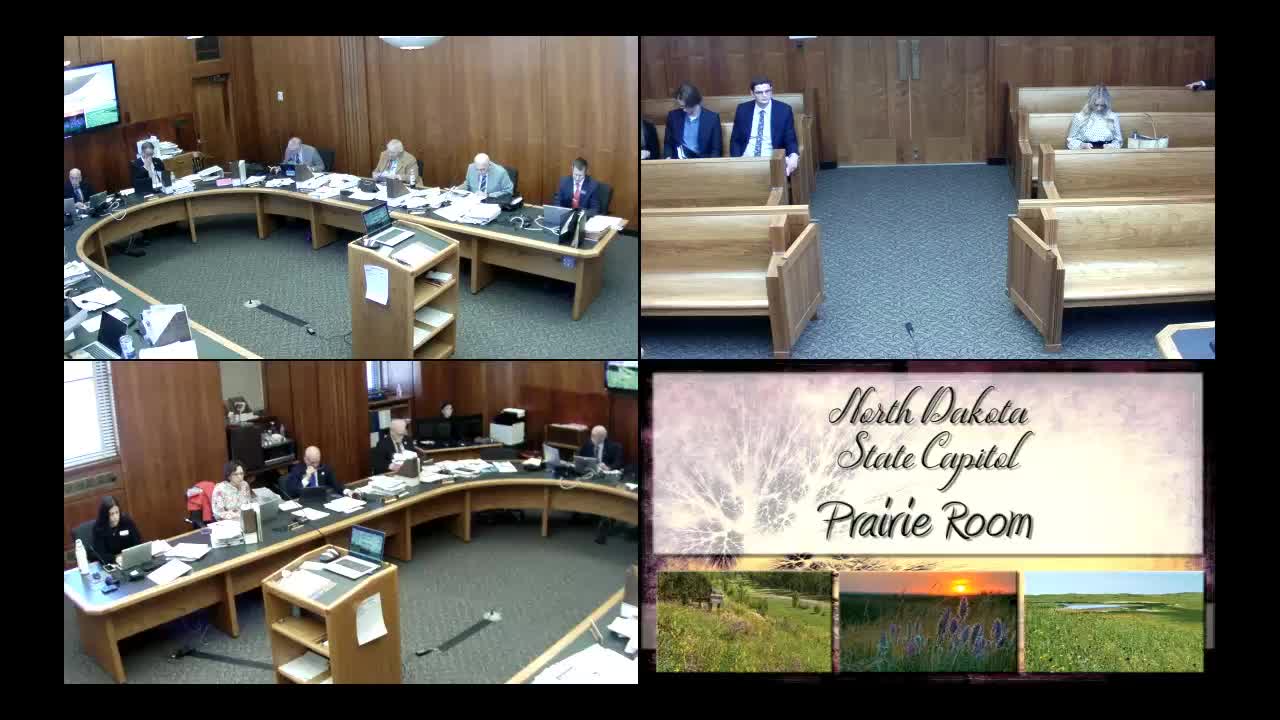Appropriations panel cuts Ethics Commission education FTE, approves 180‑day closure requirement and annual report in SB2004
Get AI-powered insights, summaries, and transcripts
Subscribe
Summary
The Appropriations — Education and Environment Division on an unspecified date took multiple budget and policy actions on Senate Bill 2004, removing a proposed education and communication FTE and stripping a $50,000 one‑time allocation for a case‑management system while approving amendments that require the Ethics Commission to close complaints within 180 days and to prepare an annual activity report.
The Appropriations — Education and Environment Division on an unspecified date took multiple budget and policy actions on Senate Bill 2004, the Ethics Commission bill, removing a proposed education and communication FTE and stripping a $50,000 one‑time allocation for a case‑management system while approving amendments that require the commission to close complaints within 180 days and to prepare an annual activity report.
The committee’s action removed the education and communication FTE that the Senate had added, a motion that passed on a roll call with six votes in favor and one opposed. Representative Martinson moved the deletion; Representative Swiatek seconded. Chairman Nathie voted yes; Vice Chairman Swiatek voted yes; Representative Lauser voted yes; Representative Hansen voted no; Representative Martinson voted yes; Representative Richter voted yes; Representative Sanford voted yes. Committee minutes recorded the motion as carried.
Representative Hansen supported additional staffing in general but said proactive outreach should reduce complaints over time, noting, “we've already exceeded the number of reports that happened the entirety of last year” in the first three months of 2025. Hansen argued additional education capacity could free attorneys to work complaint caseloads; other members questioned whether an added FTE would be effective at reducing frivolous complaints.
The committee also voted to delete a $50,000 one‑time line for a case‑management system. Representative Martinson moved the deletion and Representative Richter seconded; the motion passed 4–3. Committee discussion referenced earlier requests for larger one‑time amounts (committee materials cited prior figures including $135,000 and requests up to $195,000) and whether a partial build‑out without ongoing maintenance funding would be useful.
Members debated but did not adopt motions to add five staff positions or to raise professional fees from $50,000 to $200,000; both motions failed for lack of a second. Committee discussion noted the commission’s current base budget and that testimony indicated a relatively small staff handling a rising complaint load; staff testified the commission had a base of $70,000 for professional services plus the $50,000 one‑time that had been proposed in the Senate (together described in committee as about $120,000).
On policy, the committee approved amendments that add several procedural changes to the Ethics Commission statute, including a provision requiring that “each case must be closed within a hundred and eighty days of receipt by the commission of the underlying complaint.” The amendment drew debate over whether the timeline could conflict with constitutional language adopted by voters (Article 14, Section 4) and whether the commission would have sufficient tools and resources to meet the deadline. After discussion and amendments, the committee approved the closure timeline amendment on a 6–1 roll call (Hansen opposed).
The panel also approved an amendment to require an annual report from the Ethics Commission describing aggregated complaint statistics, advisory opinions, conflict‑of‑interest disclosures and the commission’s budget status; that amendment passed unanimously, 7–0. Committee members said the report is intended to increase transparency about workload and timing without disclosing confidential details about individual matters.
The committee moved a final “do pass as amended” recommendation on Senate Bill 2004; the motion passed 6–1. Representative Lauser was designated as the bill carrier to the next floor committee. Committee members indicated the bill and its amended long sheet will move to full appropriations soon.
Votes at a glance: - Delete Education and Communication FTE (motion carried): mover Representative Martinson; second Representative Swiatek; vote: Nathie yes, Swiatek yes, Lauser yes, Hansen no, Martinson yes, Richter yes, Sanford yes; outcome: approved. - Delete $50,000 one‑time case‑management system (motion carried): mover Representative Martinson; second Representative Richter; vote: Nathie yes, Swiatek no, Hansen no, Lauser no, Martinson yes, Richter yes, Sanford yes; outcome: approved (4–3). - Amendment adding 180‑day closure requirement (do pass on amendment): mover Representative Martinson; second Representative Lauser; vote: Nathie yes, Swiatek yes, Hansen no, Lauser yes, Martinson yes, Richter yes, Sanford yes; outcome: approved (6–1). - Amendment requiring annual report from Ethics Commission (motion carried): proposed by Representative Hansen; modified on the floor and moved by Representative Richter; second Representative Martinson; vote: unanimous (7–0); outcome: approved. - Final motion: do pass as amended on Senate Bill 2004 (motion carried): mover Representative Martinson; second Representative Richter; vote: Nathie yes, Swiatek yes, Hansen no, Lauser yes, Martinson yes, Richter yes, Sanford yes; outcome: approved (6–1).
Discussion vs. decision: committee debate repeatedly distinguished discussion items (whether an additional education FTE would reduce frivolous complaints and how best to address investigation backlogs) from formal actions (deletions of specific line items and statutory amendments). Multiple members raised concern that imposing a 180‑day deadline without additional investigative tools or staff could force premature closures; supporters said the deadline would create transparency and speed for complainants and accused individuals.
Background and next steps: testimony cited a sharp rise in complaints handled by the commission in recent years and described the commission’s staff as smaller than peer agencies in other states. Committee materials show a senate‑version long sheet totaling roughly $308,000 in net increases on the line in the Senate long sheet for salary, FTE pools, IT, professional fees, travel, and one‑time items; members noted individual line items were adjusted during the committee process. The bill, as amended, will be carried by Representative Lauser to the next appropriations consideration.
